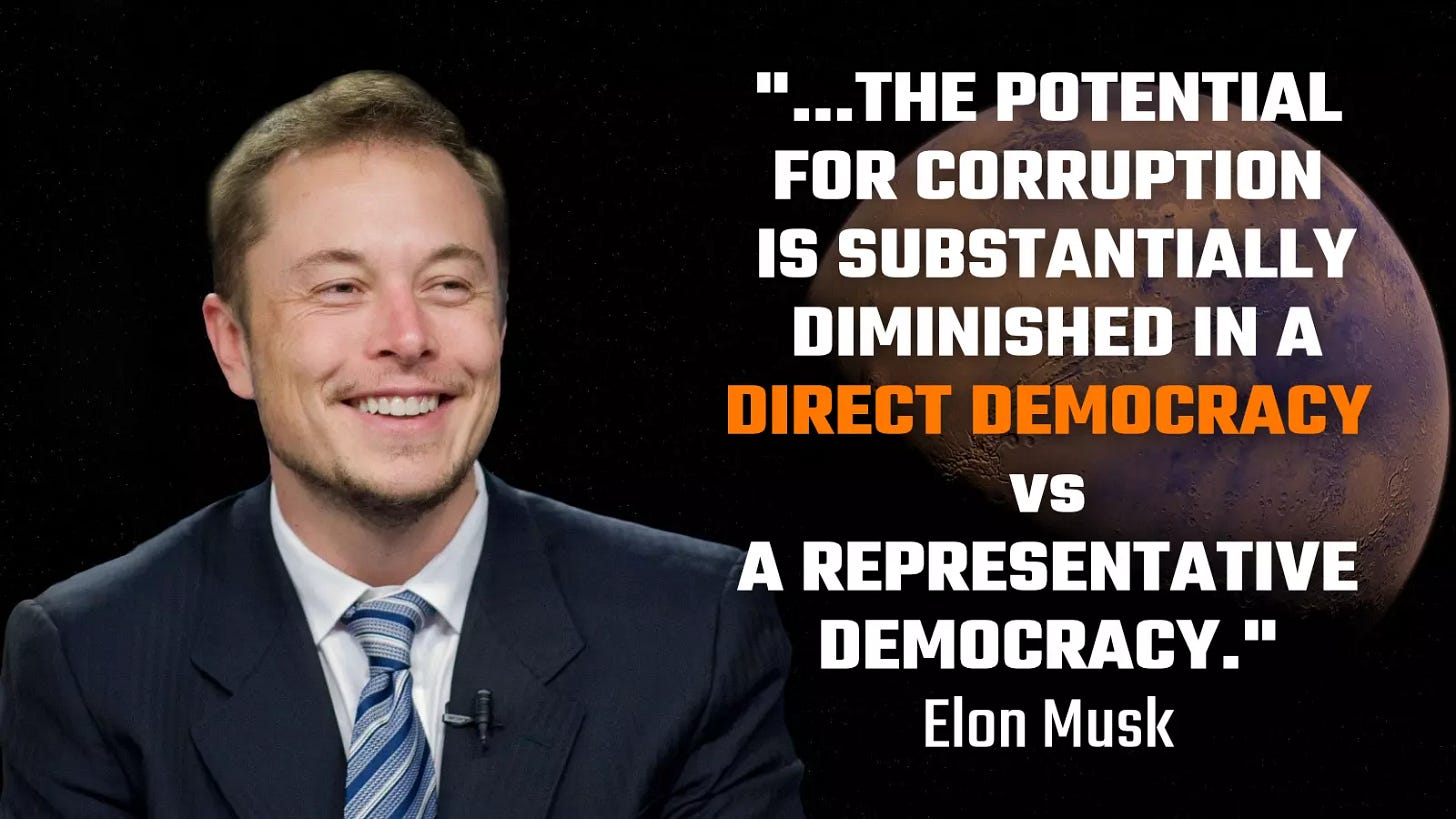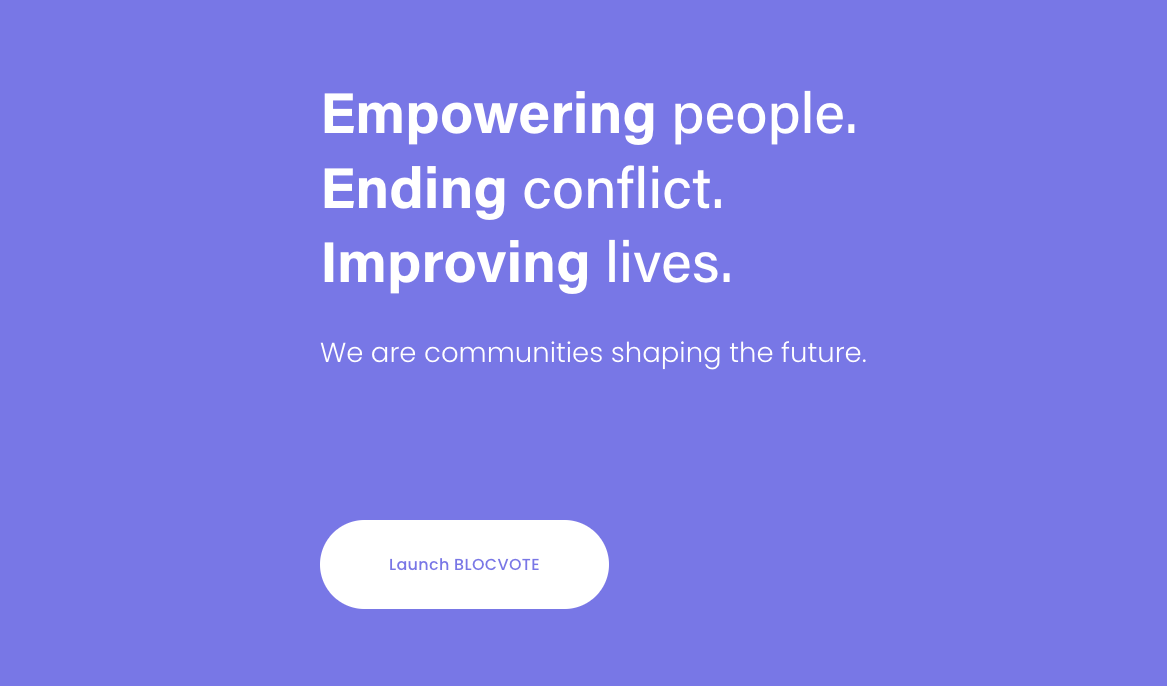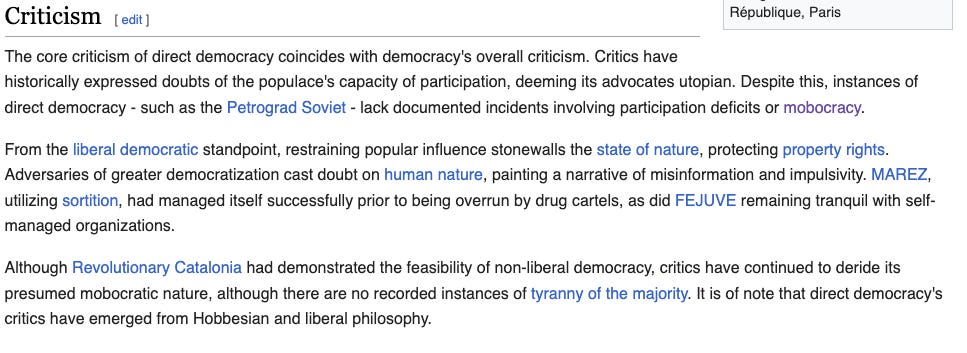Could Direct Democracy Save the UK?
Why Direct Democracy could be the solution the UK desperately needs and challenging the arguments against it!

Winston Churchill is often incorrectly quoted as saying: "The best argument against democracy is a five-minute conversation with the average voter."
Though he sometimes despaired of democracy's slowness to act for its preservation, Churchill had a more positive view of the average voter.
Nowadays, most in power, the media, and academia agree that less democracy might be a good thing.
An example of this is Jason Brennan. In his 2016 book Against Democracy, Brennan argues that many political questions are too complex for most voters to understand. Worse, voters are ignorant of their ignorance. They can't judge complexity. They are too attached to simplistic, feel-good solutions.
Brennan writes:
"Suppose the United States had a referendum on whether to allow significantly more immigrants into the country. Knowing whether this is a good idea requires tremendous social scientific knowledge. One needs to know how immigration tends to affect crime rates, domestic wages, immigrants' welfare, economic growth, tax revenues, welfare expenditures and the like. Most Americans lack this knowledge; in fact, our evidence is that they are systematically mistaken."
The EU is another example of believing less democracy is good. The EU is a technocracy, not a democracy. It is a protected sphere of policymaking, free from direct democratic pressures.
As one astute observer of EU politics, Kathleen McNamara, put it,
"The EU governs, rather than represents."
Critical decisions made by unelected EU technocrats are made without any input from citizens. They cannot remove technocrats if their decisions prove unpopular.
In David Harsanyi's book 'The People Have Spoken (and They Are Wrong)', he said:
"Democracy is, by any reasonable standard, the most overrated, overused, overvalued, and misunderstood idea in political life. We have way too much of it. We think way too much of it."
Is this true, though? Is democracy a lousy model of governance? Should we have less of it?
Not everyone agrees.
In his book Let the People Rule, John G. Matsusaka argues for direct democracy. This would expand access to decision-making and enhance democracy, making it a more effective solution.
But as Matsusaka notes, we are in the minority. He writes:
"A few months after the 2016 elections, I attended a conference of economists, lawyers, government officials, journalists, and activists. The conference was about competition policy, but the issue on everyone's mind was how to understand Brexit and Trump's win. The keynote speaker was an eminent scholar with a distinguished public service record. His remarks traced the populist backlash to the failure of elites over the past generation to understand and respond to the economic concerns of less-educated workers who have been buffeted by globalisation, automation, and the transition to a knowledge-based economy.
After diagnosing the problem, he offered a solution: elites in the policy community should do a better job of listening to and understanding the concerns of ordinary people.
I found it a remarkable blind spot that he did not mention the other possibility: giving the people more of a voice in decisions. His operating assumption, which I suspect was shared by most people in the room, was that elites would continue to monopolise policy decisions. The only question was how they should do it better."
So, what exactly is Direct Democracy? Many people are unfamiliar with the term or with how the models can work.
The elites of society obviously don't think it's a good idea (or maybe that's because they don't want it!).
Let's explore what Direct Democracy is and why it would be a much-improved model compared to what we have in the UK now.
What is Direct Democracy?
According to Wikipedia,
"Direct democracy or pure democracy is a form of democracy in which the electorate decides on policy initiatives without elected representatives as proxies. This differs from the majority of currently established democracies, which are representative democracies."
There are, of course, many different forms of Direct Democracy.
Each uses referendums, initiatives, and recalls to make decisions directly. This can make it difficult for a government to pass any law or legislation that isn't popular with the majority of citizens.
Let me explain what each of these is in a bit more detail...
A referendum you've probably heard of already, especially after Brexit! In essence, voters directly decide on laws and policies through referendums.
These ballot measures let citizens weigh in on crucial issues, bypassing lawmakers. Referendums empower the electorate, allowing people's voices to shape governance directly. This may result in the adoption of a new policy or specific law, or the referendum may be only advisory.
This is in contrast to an issue being voted on by a politician or MP, as in our current system.

An initiative is like a referendum. But it is 'initiated' by the citizens, not by the government or parliament—a petition in effect. Usually, once an initiative has met certain hurdles, it has to be accepted by the government.
A recall is a procedure to remove an elected official from office. Voters do this through a referendum before the official's term ends. Recalls first appeared in the constitution of ancient Athenian democracy. They aren't very common in countries nowadays, or at least not easy for the public to initiate. (For some reason, elected officials don't like it—funny, eh?)
Then, we have semi-direct democracies. In these, elected representatives handle day-to-day governance, like in representative democracies. However, the critical difference lies in the power retained by the citizens.
In these systems, citizens can directly influence laws and government actions through referendums, initiatives, and recalls. This balance maintains the efficiency of representative governance, but the ultimate authority still rests with the people.
Switzerland is a well-known example of a semi-direct democracy. Like other democracies, Switzerland has a federal parliament. However, citizens often vote on referendums and initiatives, giving them a direct hand in shaping policy. This model lets citizens override or support their representatives' decisions, ensuring the government aligns with the people's will.
At Democracy: Upgraded, we believe that semi-direct democracy, along with other tweaks (like having zero political parties), is the best model.
Some might like the idea of a country without politicians or government, but it would not work in reality.
We need politicians and a government for emergencies and daily management of the country. Events like an act of war against the UK or a sudden nationwide emergency require a quick response.
When voters lack interest or engagement, MPs serve as vital conduits. They amplify diverse voices nationwide, bridging gaps between the public and policymakers. They represent even overlooked issues, helping maintain a strong democracy.
Semi-direct democracies like Switzerland inspire our model. But, it has key differences that set it apart.
One of the most significant distinctions is the emphasis on more frequent referendums. In Switzerland, citizens vote on crucial issues a few times each year. Our model would encourage more frequent referendums on a broader range of topics. We believe people should have a say on critical issues like taxation, healthcare, immigration, and education. Their voice should be heard constantly, not just at election time. It should not be ignored if it's inconvenient.
Another fundamental aspect of our model is the elimination of political parties. In Switzerland, political parties shape policy and run the government. They still play a central role. However, in the Democracy: Upgraded model, all MPs would be independent.
This shift removes the divisive nature of party politics. Party loyalty can sometimes overshadow the needs of the voters. If all MPs are independent, they can focus on their constituents. They won't be pressured to align with party platforms or leaders.
In other words, they should be doing the will of the people, not the party!
Our model would also make it easier to start referendums and recall representatives. In Switzerland, referendums and initiatives need many signatures to be triggered, which can limit citizens' direct involvement in governance.
Our system would make it easier for citizens to initiate recalls and lower the barriers to such actions. Citizens could act directly if they feel their representatives are not acting in their best interest.
This would give voters a better tool to hold MPs accountable and ensure their voices are heard in real time, not just at elections.
Our model aims to enhance democracy. It will give citizens more control over key decisions and create a more responsive and accountable system.
The removal of political parties, more direct referendums, and easier recalls create a more participatory governance. Now, the people truly hold the power.
Addressing common arguments against direct democracy
Obviously, direct democracy (and our model, too, I'm sure) attracts criticism.
Let's address some of the main ones here briefly, and a future post will cover this in much more depth.
Lack of Informed Decision-Making
Critics always argue that the public cannot be trusted to make decisions in a direct democracy because they are simply not informed enough about issues.
My first counterargument would have to be: What makes you think politicians are more informed? Seriously, MPs have a lot to deal with on a daily basis. And let's remember, they are just people like you and me.
What makes us think they are any more informed than we are on every issue? The fact is, they learn more about some issues than others, just like the general public. On other issues, they go with the majority of the experts or don't attend votes/debates.
I don't think that's any better.
Our model still has MPs. Their job would be to dive deeper into pressing issues, engage the right experts, boost the arguments for and against a proposition, and give the public equal time to decide.
This shift would also allow private think tanks to better inform the public and help groups organise awareness campaigns.
We want an informed public. And technology nowadays can help with that.
Voter Fatigue
This is a genuine concern. When voters are asked to engage on every topic, they lose interest and could stop voting.
This can lead to rule by an engaged minority, not the wider population, and create imbalances in democratic participation.
However, it is worth noting that the same happens with MPs now. They don't always vote on every issue; if they do, they go along with the party.
We would likely see high voter turnout on critical issues. Less essential issues needing more expertise would be left to a few engaged people.
This isn't necessarily a negative outcome. It's often best to consult experts and informed voters on complex issues like quantitative easing. They have the knowledge to make good decisions.
If a group thinks an issue needs attention, public campaigns can engage the electorate over time.
This is also where a semi-direct democracy can help. In this system, the government and MPs decide on any vote that fails to meet the minimum turnout.
If the public thinks the decision is wrong, they can submit an Initiative to overturn it.
Tyranny of the Majority
Have you ever argued with ChatGPT before? This one had me going back and forth for a while!
A common objection to direct democracy is that majority rule can sometimes overshadow minority rights.
The issue I have with this argument is that it kind of insults the general public. It insinuates that, without our beloved politicians, we'd devolve into animals and trample minority rights.
One way to ensure this doesn't happen, though, is to have a strong constitution. It would protect fundamental rights, and a supermajority would be needed to change or overrule it.
So, any new initiative that violates the constitution would be rejected. The people would have to amend the constitution first, which is very difficult, as we see in the USA and Switzerland.
In its long history of direct democracy, Switzerland has had just one potential issue of 'tyranny of the majority'.
In 2009, Switzerland passed a referendum to ban the construction of new minarets, with 57.5% of voters in favour of the ban.
Some decried it as the 'tyranny of the majority'. But, it is a valid expression of what the people of Switzerland wanted. They didn't propose to destroy existing minarets or stop Muslim worship. They just wanted to limit the growth of something they felt was changing their own culture and towns.
The fact that Switzerland did not ban existing minarets or restrict worship shows that this decision was nuanced and reflected the majority's concern about cultural change, not outright oppression.
The fact is we all have to abide by majority rule. We aim for fairness and have a solid constitution to protect minority rights and freedoms. But if I travel to Dubai, I do not expect to get my own way when I am in the minority.
Minority rights and majority rule aren't mutually exclusive. A strong constitution ensures balance, where direct democracy can thrive while fundamental rights are protected. This helps reduce the likelihood of any actual "tyranny" while respecting the will of the people.
Influence of Populism and Emotional Decisions
Similar to the 'Tyranny of the Majority' argument, I wonder why MPs and politicians are less prone to emotional decisions than the public.
Also, populism seems to be a term that is thrown around as an insult, but I don't really understand why. Isn't the opposite of populism elitism, where a few detached people make decisions, ignoring the public?
Why is that a more democratic and better alternative?
I firmly believe that a direct democracy society that is underpinned by a strong constitution will be able to distinguish between emotional and rational decisions. If you allow time for both sides to argue and debate before a vote, you'll generally get the 'right' decision. Remember, doing the 'popular' thing is how democracy is supposed to operate. Populism is not a bad thing if minority rights are safeguarded and proper time and debate is given.
Switzerland is again a living example of this. It hasn't made irrational decisions. It carefully considers each issue before voting, resulting in a stable democracy where long-term thinking and planning are valued.
Cost and Logistical Challenges
This is a valid concern, but one that can be mitigated.
Technology can help with the voting process—much more 'online voting' can be introduced to reduce costs and logistical challenges. Estonia has a secure online voting system. It shows that we can digitise elections while keeping them secure and fair.
We could use blockchain for secure online voting. It would ensure transparency and cut the costs of verifying results. Blockchain has already shown promise in small-scale elections.
Blockvote.org is one example. It has built a secure voting environment. It shows promise as a scalable solution.
Switzerland copes quite well with a wide range of voting styles in their different cantons.
Also, Democracy: Upgraded promotes using private think tanks and campaign groups. An independent body, like the Electoral Commission, would coordinate them. This would ensure the public can access solid and well-rounded arguments from both sides, enhancing informed decision-making without burdening government resources.
Risk of Manipulation and Misinformation
We all deal with manipulation and misinformation now, even our politicians. In fact, people are losing confidence in the government and politicians because they use manipulation and misinformation as much as anyone else.
The Edelman Trust Barometer records a disturbingly low 30% trust score in the UK's political system.
This is why an independent group, like the Electoral Commission, could have their duties expanded. They could document the best arguments for and against any proposal.
It would also help prevent most from falling for misinformation. This is in addition to private think tanks and promoting verified facts.
This should be balanced by strong free speech laws, as noted in a previous post here.
We have to trust the public to be responsible. Again, Switzerland proves the public is not as gullible as some think.
Interesting note on Wikipedia...
I found the Wikipedia page on Direct Democracy very interesting. The criticisms section noted that "there are no documented instances of widespread problems like mob rule or participation deficits in real-world examples of direct democracy."
Doesn't that answer many standard arguments against giving the public more power?
Conclusion: Time for Change
There is a crisis of confidence in the UK's political system. Many of us feel disconnected from the decisions that affect our lives. Direct democracy, backed by a strong constitution, can revive our politics by restoring power to the people.
It ensures greater accountability, transparency, and responsiveness—three elements sorely lacking in today's governance.
Switzerland has shown that a more engaged and empowered electorate can lead to a stable, thoughtful democracy. The time has come for the UK to consider this model.
By embracing direct democracy, we can create a system that reflects the people's will. The public would be the driving force behind decisions that shape the country's future.





